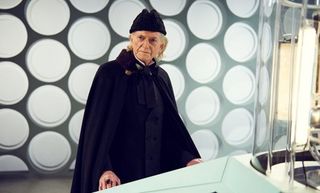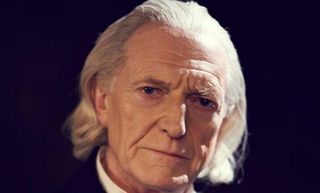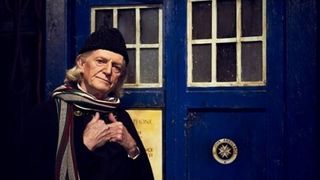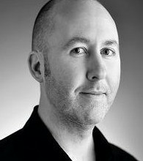Meet the man playing William Hartnell, the first Doctor, in 50th anniversary celebration An Adventure In Space And Time ...

We’ve seen you dressed up as the First Doctor and the resemblance is startling. Was that important to you?
You want to hopefully convince people of not only him as Doctor Who but also as William Hartnell. There’s quite a lot of scenes with him as Bill. I admired him terrifically as an actor having seen him in This Sporting Life and Brighton Rock , and I think he was one of the great unsung heroes of British film in his early years. His CV is enormous - well before Doctor Who he was already a well regarded actor. I’ve seen some of the reviews of his early films and he had quite a reputation. I feel quite a responsibility to do not only him justice, but all the legions of fans who remember him.
We hear original director Waris Hussein saw you in the costume and found it quite moving…
Yes, I was told he was watching the monitor when I did my first scene. Mark Gatiss told me that he saw him welling up a little bit when he saw it. I was very touched and very gratified by that, because he was there, at the epicentre at the time and I’m sure it brought back a lot of memories for him.
Did you go back and watch the old stories on DVD?
Yes, I’ve been watching them, and we have some scenes where we recreate “An Unearthly Child” - not only the pilot that went out but the original pilot that was rejected, the one that they remade. I was amazed at how he could adjust his performance so quickly from being regarded in the first pilot as too aggressive and too nasty. He wanted to be more playful with it, and just seeing the two, the first pilot and the first episode, straight after one another, how quickly he changed his performance. The idea that he was doing it 48 weeks of the year or something, and of course none of the actors had the benefit of doing retakes. We all forget our lines from time to time but we just say “Ok, pick it up from wherever or do the scene again.” They were only allowed four tape stops, I think, and that included going from the junkyard into the interior of the TARDIS. They didn’t have much time to do retakes over minor script diversions! I was full of admiration for the way they all worked so quickly, and with such a lot of nerve. It was filmed as though it was live television… the speed that they worked at and the pressure they must have been under! When I watch them it adds more spice.
What do you think of the first story as a piece of TV?
Considering the technology available and the time they had, and the restrictions of working in what was a tiny studio – there wasn’t even room for both sets, they had to take the junkyard down to get the TARDIS, and they had to work under great pressure and very quickly. It just made me more admiring of what they did, the coolness of people like William Russell and Carole Ann. I just wonder how they kept their heads and appeared so cool on camera. I’m sure they weren’t…
Have they given you any insights into how Hartnell was to work with?
Yes, I asked Carole Ann and Bill what he was like to work with and they both said that he could be absolutely charming and great fun to be around, but on other days not so much. He was a complex man, and I think his background and his upbringing probably had a lot to do with that. The main thing was that he was a consummate actor and an absolute perfectionist, and he expected that of other people around him. When he felt they didn’t have the same commitment to the project or were flippant about it, that would upset him greatly.

Was it a challenge to capture his voice?
Not many people know what Bill Hartnell sounded like, but I have a clip of him after Doctor Who , in a dressing room, doing panto, a year after he finished, and that’s the only clip I’ve seen of him talking as himself. Of course for the Doctor Who voice I’ve got the benefit of seeing all the episodes over and over and over, and one tries to catch every inflection and every movement because there’ll be people watching who will expect that. What I can tell from the brief clip I’ve seen is his register was lower in tone than his voice as the Doctor, especially when he made the Doctor more playful and had that twinkle, as Verity Lambert called it. It was slightly more up in the air. He seemed to be more of an earthbound type of guy, from what I can tell, and this (the Doctor) is much lighter.
Do you take on some of the mannerisms, like clutching the jacket lapels?
Yes, that’s right – that was probably something he did in real life when he was giving someone a little ticking off or whatever, and he incorporated it into the Doctor and it became his signature in a sense.
Is it a fine line between impersonation and finding your own take on William Hartnell?
I think it’s important to get the voice, and try and recreate as much as you can, but you’ve also got to try and invest the part with his spirit. I don’t know how to put it, really… capturing his spirit is just as important as getting the voice right.
Your character goes through quite a transformation. At the beginning he’s reluctant to play the Doctor…
I think the idea of playing a part like that was attractive to him, but when it was mentioned that it was for children… My memory of children’s television was all Muffin The Mule and Andy Pandy and maybe Crackerjack , and so one can probably understand his initial reluctance, that maybe he wasn’t being taken seriously. I think once he met Verity Lambert and Waris Hussein and Sydney Newman he realised that it was going to be quite a career departure for him. I think he felt frustrated with always playing either petty crooks or authority figures, sergeant majors. That’s the sort of thing he was offered. I suppose it was true of most actors in film in those days – once you were bracketed as a vicar or a policeman or whatever… I think he had fun. He realised as soon as they started that they were really on to something, especially when the kids started doing the Dalek voices and following him… He found this new audience that he never expected to get. He absolutely reveled in it.

Do you remember the show beginning?
Oh yes, I do, and I remember first seeing the Daleks and then watching Patrick Troughton. I watched some of the Jon Pertwee ones, but by then the pub started to take priority on a Saturday evening! And later on, when Tom Baker was playing him, my good friend Louise Jameson was his sidekick, and so we used to watch it because of her, because she was a good mate. But then I kind of lost it when I started working as an actor. It went off the air for quite a long time, didn’t it, and I never really picked it up again until watching Matt Smith, because of the episode I did last year, "Dinosaurs On A Spaceship". I love what he does with the Doctor – he’s got that right level of curiosity, and that’s one of the main driving forces behind William Hartnell’s Doctor. He seemed endlessly curious about the universe and the world and Matt’s got that, plus that right level of eccentricity and sense of fun.
Do you think this might inspire younger Doctor Who fans to go back to the originals?
I hope so, because I thought he was a terrific screen actor and even with the limitations of the time his performance still shines through. Terrific, terrific. I was never sure who my favourite Doctor was but now I think it’s Bill, I have to say. All the subsequent actors who’ve played him have defined the part for themselves. He defined it for the first time. He had no template to work from. He just found this character and the right look and everything and he just went for it. I think it rejuvenated him in many ways, and I think it probably hurt a great deal when he had to give it up.
Is this essentially a tragic story?
I suppose in some ways it is, but in many other ways he appreciated the fact that he’d given it his best shot and he’d made something of it and proved to himself and others that he could do it, and I think he took a lot of satisfaction from that. It’s about life and about people. It’s not just a sad tale. And it’s not a biopic of William Hartnell, it’s about the making of Doctor Who as well. What Mark’s done is a brilliant balance of his personal story and the story of the series. This is going to be watched by legions of Doctor Who fans but one mustn’t assume that it’s just for them – it works as a piece of human drama on its own, and one hopes that people who aren’t Doctor Who fans, who have never seen Doctor Who , will find it fascinating as well. That’s what Mark, for me, has got in the script, the human drama of the personalities involved.
Would you have liked to have played the Doctor yourself?
I would have loved to have played him. But just to have a shot at doing something that’s hopefully honouring William Hartnell as an actor is enough for me.
Nick Setchfield
An Adventure In Space And Time is on BBC Two on November 21st at 9.00 pm

